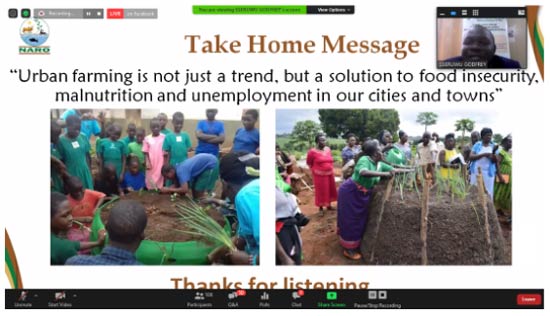How can agricultural extension and advisory services (AEAS) be positioned for resilient agriculture and food systems?
This was the discussion at Uganda’s third Agricultural extension Symposium. The event which brought together a community of researchers, practitioners and policymakers from Uganda and beyond took place on 10-20th July 2020, at a time when most countries were under lock down due to the Covid19 pandemic.
Held virtually for the first time, this interactive virtual and free Symposium brought together more participants than ever before. While in-person interaction in the face-to-face conferences was missed, the innovative online approach provided an opportunity to engage.
The Extension Symposium in numbers:
- Over 900 participants online
- 29% females
- 699 were from Uganda
- 152 participants physically
- 37% females
- 34 Countries were represented
- 02 blended physical and online events-Opening of the Symposium and Closing
- 07 webinar series
- 04 radio talk shows
- 38 presentations
- Over 200 tweets and retweets about the event #AgExtUG2020

Above: Presenters during one of the webinars at the Symposium
Conference presentations:
The event was organized under various sub-themes below:
- Climate Smart AEAS-Capacity and needs of actors;
- Mainstreaming Sustainable Land Management in AEAS;
- Youth Engagement in AEAS and Agri-preneurship-as providers or clients;
- Emerging Competitive e-extension Models
- Public and private AEAS for Animal and Fisheries Sectors
- AEAS support to Urban and Peri-Urban Agriculture
- Positioning of Agricultural Extension education for resilient agriculture and food systems
- Experiences of agricultural inputs provision with extension Services
- Farmers Perspective on the effect of the current vulnerabilities
All the 38 presentations made under the above themes can be accessed freely on the UFAAS website here.
Information from the various presentations and channels was packaged into various products.
Please stay tuned for the communiques on the UFAAS website.
Insights from the event evaluation:
The online evaluation of the event provided valuable insights for extension methodologies, climate smart agriculture, and more. Of the 80 people that gave feedback, over 65% of participants found the event convenient, and cost effective, 88% reported that content presented at the symposium was relevant to their work; and that the event was timely to keep them engaged at a time when they were in lockdown. Some hiccups were highlighted such as unstable internet, and technology connectivity.

Slide from one of the presenters at the webinar on AEAS support to Urban and Peri-Urban Agriculture
A few tips:
Here are a few pieces of practical advice based on our experience organizing an e-symposium, and from the evaluation:
- Working together with partners leads to tremendous results /accomplishment, and an e-Symposium is far reaching in terms of participants location and sector.
- The use of platforms such as Zoom to host the meetings really helps to bring together people to discuss salient issues.
- Have the appropriate equipment to use, and test in advance. Assign who does what during the presentations e.g., technology control, moderation etc..
- When combining blended physical and online meetings, harmonise the timing The online audience is usually not engaged. Have an online moderator present at the physical event to always update the audience.
- For the webinars, keep the audience engaged. e.g., use polls, and encourage the participants to provide input, share experiences through chat. Have sometime to summarise the input in the chat box
- Try to keep time for the scheduled activities
Recognition:
We thank the African Forum for Agricultural Advisory Services (AFAAS) the Ministry of Agriculture, Animal Industry and Fisheries (MAAIF), and all partners for making the event possible. Special thanks to the Local Organising team for the invaluable input.
